The Third Way.
Manipulative socialists often misrepresent Thomas Paine, falsely asserting that he spoke of "Human Rights and Responsibilities." However, this is a deliberate distortion; Paine actually emphasized "Human Rights and LEGAL Responsibilities."
And while that might appear an odd place to start on the topic of Tony Blair’s ‘Third Way’, I assure you that is entirely relevant.
Paine’s argument in fact presents a VERY different proposition to contemporary calls for 'Human Rights and Responsibilities'; the key difference being that Paine grounded his argument within a LEGAL framework, whereas contemporary socialists will argue for an ETHICAL approach, supported by legal statutes. And those perspectives lead to fundamentally different outcomes.
A legal framework defines what you CAN do, ensuring that everyone is equal before the law. Should you break it, you will face the consequences as your neighbour. And this system has been the foundation of a prosperous West, safeguarding INDIVIDUAL rights through LAWS. It fostered a society where people in general understood the boundaries of permissable behaviour, and conformed.
An ethical framework on the other hand, dictates what you SHOULD do - not what is legally permissiblee, but what is considered ‘ethical‘ or ‘right‘, as defined through some ‘Ethics Declaration‘ upheld by an ‘Ethics Panel‘, potentially with even an enforcement mechanism ensuring compliance. Those who refuse are fired - or even prosecuted - like those doctors during the alleged pandemic.
The argument here ultimately revolves around individual liberty versus the ‘collective good’. And that's where the socialist perspective enters the frame -
You have the RESPONSIBILITY to uphold the COLLECTIVE RIGHTS of others.
This approach is not about Western-style liberty at all. Yet, in contemporary discourse you will find socialists who try to eqate the two by arguing that your ‘rights’ should be ‘balanced’ versus those of others, making the issue of rights a moral, even ethical, matter. And many particularly nauseating example of this comes courtesy of the Markkula Center of Applied Ethics, with this article titled ‘Rights’1 being just one example.
These are nothing short of deliberate falsehoods designed to make collectivism appear as freedom. And nothing could be further from the truth.
The advantage of a legal framework is its uniformity—one size fits all. But with an ethical one, two cases are never the same. The 'ethics' will be judged very differently, depending on who you are - and the context of your 'ethics violation'. Even factors like your bank account or whether you fly a drone on Tuesdays could influence the verdict. And that's precisely the point. Because this ‘flexibility’ allows for the weaponisation of ‘ethics’, ultimately enabling arbitrary rule.
Thus, eliminating the LEGAL framework and replacing with an ETHICAL one paves the way for gross abuse. It opens the gates for the express opposite of freedom. And this is why they attempt to shove through their ‘Global Ethics’ in every field and context imaginable, with ‘ethics disclaimers’ now present in virtually every domain.
This is why you should be vigilant when contemporary politicians speak of ‘Human Rights and Responsibilities’. Because their definition is likely rooted in a collectivist perspective, which fundamentally runs counter to the system that led to the West’s prosperity.
And as for Paine - I won’t delve into the specifics, but let me emphasize what his definition of ‘rights and responsibilities’ truly entailed, as outlined in ‘The Rights of Man‘2 -
Five: The law ought to prohibit only actions hurtful to society. What is not prohibited by the law should not be hindered; nor should anyone be compelled to do that which the law does not require.
Eight: The law ought to impose no other penalties but such as are absolutely and evidently necessary; and no one ought to be punished, but in virtue of a law promulgated before the offense, and legally applied.
Eleven: The unrestrained communication of thoughts and opinions being one of the most precious rights of man, every citizen may speak, write, and publish freely, provided he is responsible for the abuse of this liberty, in cases determined by the law.
I could go through other sections, but I fail to see the point. This is about establishing a minimum legal framework, and absolutely not about ‘commutative justice’3 in any way, shape or form, despite what socialists might have you believe through their most subversive and manipulative tactics.
Thus, when Thomas Paine spoke of ‘Rights and Responsibilities’ he was referring to ‘Human Rights and LEGAL Responsibilities‘. And with the intro done, let’s see why that’s relevant in the context of Tony Blair’s Third Way.
I spent a considerable amount of time in a failed attempt to dig up this document, but it was absolutely scrubbed from the web. However, through persistent digging, I managed to uncover large sections of the book, but without formatting, graphics and so forth you’re likely to miss key detail. So I was rather grateful to be on the receiving end of divine intervention, as the full document arrived through email, courtesy of someone wishing to remain anonymous.
I recently wrote a detailed article on the Fabian Society, who published the above. In fact, this Fabian Pamphlet 588 is one of very few that cannot be located on the various online databases, including prominent ones like JSTOR4.
In the context of the ‘transparency’-inclusive ‘ethical’ principles of ‘Good Governance’, what does it really say about the Fabian Society that they aggressively push these values upon others, while concealing key documents of their own?
That it raises serious questions about their commitment to the very principles they advocate, suggesting a disconnect between their public stance and private practices… no, better yet - that you cannot trust them, even? That they are manipulative liars, and borderline frauds who do certainly do not practice what they preach?
Either way, as Tony Blair explains early on -
‘The Third Way stands for a modernised social democracy, passionate in its commitment to social iustice and the goals of the centre-left, but flexible. innovative and forward-looking in the means to achieve them.‘
… but so far, I am largely none the wiser -
‘It is founded on the values which have guided progressive politics for more than a century - democracy, liberty, justice, mutual obligation and internationalism.‘
Oh, wait, I am now. We’re not even out of the intro, and he already gave us a hint.
‘My vision for the 21 century is of a popular politics reconciling themes which in the past have wrongly been regarded as antagonistic - patriotism and internationalism: rights and responsibilities: the promotion of enterprise and the attack on poverty and discrimination.‘
And there it is again. More on the latter later on.
‘The Third Way is a serious reappraisal of social democracy, reaching deep into the values of the Left to develop radically new approaches’
Radical they truly are - and certainly not centre-left. More on that later, too.
‘I want in this pamphlet to explain the Third Way to a larger audience. It does not seek to paint a full canvass‘
And on that point, it succeeds remarkably well, as everything is hiding in plain sight behind that opaque wall of terminology.
He continues by detailing that we require a thriving civil society, that values are not absolute (par for the course - socialists rely on relative values), and goes on to detail his four values -
Equal Worth, featuring social justice, the end of discrimination, prejudice, and the rights and dignity of individuals.
Opportunity for All, which not only seeks wealth redistribution, but also carries on through this cryptic phrasing -
’For the Right, opportunity is characteristically presented as the freedom of individuals from the state’ - only to continue - ‘The Left, by contrast, has in the past too readily downplaved its duty to promote a wide range or opportunities for individuals to advance themselves and their families.‘
And this means handing the state an element of control over who should be allowed to advance.
’At worst, it has stifled opportunity in the name of abstract equality.’
Which is a weaponisable term, because it could be taken to mean absolutely nothing, yet absolutely everything.
’Gross inequalities continue to be handed down from generation to generation, and the progressive Left must robustly tackle the obstacles to true equality of opportunity.’
And that - with a hint of intergenerational justice - means transferring power away from the free market and individualism, and to some bureaucrat working for the state and thus - the collective.Responsibility - ‘For too long, the demand for rights from the state was separated from the duties of citizenship and the imperative for mutual responsibility on the part of individuals and institutions.‘
And there you are. Incidentally, this ‘demand for rights’ was put in place because of egregious abuse of power by those in charge of states. Many, many, many gravestones should remind you of that inconvenient fact.
’Our responsibility to protect the environment’
And there’s another broad hint as to where he’s going with this.
’The rights we enjoy reflect the duties we owe: rights and opportunity without responsibility are engines of selfishness and greed’
Do you see it yet? Tony Blair wants us hooked up with those ‘Duties to uphold the collective rights of others’.Community quickly dives into our ‘collective goods’, our ‘local communities’, and the ‘voluntary sector’ (ie, civil society organisations) before outright stating that -
’… freedom for the many requires strong government’
Ie, he’s a collectivist, who further seeks to ‘use the state as an enabling force‘.
‘These are the values of the Third Way’ he outlines before adding ‘what matters is what works to give effect to our values‘, and to this extent he adds ‘policies flow from values, not vice versa‘.
We can then add the first of a number of mentions of ‘social exclusion’ before the somewhat odd inclusion of the term of ‘permanent revisionism’, which could be an indirect hint about the relative values he spoke of early on. The very same which should drive policy.
Chapter Two is titled ‘The Third Way in a Changing World‘, and it features a somewhat interesting history lesson, primarily because he acknowledges that the right indeed were correct on some counts, before detailing globalisation, technological advance, and the rise of skills of information being of pivotal importance going forward. These are of course difficult to disagree with, but he follows through by including -
‘We need to shape modern institutions of work, and the institutions in which children are brought up, on the basis of enduring values justice for all, responsibility from all.‘
Now, twice he told you about relative values, and suddenly, he now speaks of enduring ones? Well, surprising as it may appear, do be aware that those ‘enduring values’ quoted - justice and responsibilities - not only are interpretative matters, but the latter again repeats the ‘responsibilites’ discussed above. And next comes probably for what ‘The Third Way’ is most well-known -
‘Governments… need to learn new skills: working in partnership with the private and voluntary sector; sharing responsibility and devolving power…‘
We have governments (public), we have private, and we have the voluntary sector (civil society organisations). That’s the Stakeholder Approach.
Then follows the four broad policy objectives -
A knowledge-based economy… where ‘the power of the market is harnessed to serve the public good’.
A strong civil society enshrining rights and responsibilities…
A modern government based on partnership and decentralisation, where democracy is deepened…
A foreign policy based on international cooperation.
And finally, the financial independence of the Bank of England is casually thrown in. I don’t know about you, but it appears a tad odd and it’s not immediately obvious why that’s a net benefit.
Chapter Three follows through a ‘Modern Dynamic Economy‘. It starts with a somewhat… socialist description of past antagonism between capital and labour, before stating that New Labours partnership with business is ‘critical to national prosperity’, appearing somewhat disconnected.
And though he speaks of small enterprise, what actually took place was partnerships with large corporations, overwhelmingly. But - interestingly - a mention of ‘fair standards at work’ is added (more on that soon), before returning to the Bank of England, and singing to the glory of their operational independence, setting interest rate policy. It just feels so oddly detached… forced, even, because there appears to be no valid reason for this inclusion. And this then follows with a claim that -
‘We cannor abolish the business cycle but we can reduce its amplitude’
And this appears somewhat at odds with New Labour, not only because Gordon Brown explicitly stated that ‘there will be no return to boom and bust’5, but also given that 2008 conclusively proved that a patent falsehood. And this is then followed by the usual Labour promise to ‘make work pay’. I’m pretty sure that lie is a mandated inclusion in every election manifesto of theirs6.
Next follows what might appear a tad odd -
‘I fully recognise that the private sector, not government, is at the forefront of wealth creation and employment generation… our approach is competition where possible, regulation wher necessary‘
… which of course is also completely ripe for abuse as that is yet another interpretative call. And then follows the mention of the Public-Private Partnership in Science.
Chapter Four was the one I could not reconstruct via online sources. The title alone might somewhat explain why - ‘Strong Civil Society: Rights and Responsibilities‘ -
‘We seek a diverse but inclusive society, promoting tolerance within agreed norms, promoting civic activism as a complement to… modern government.’
It’s interesting phrasing, because beyond explaining a mindset similar to that of Trudeau - allowing politically expedient demonstrations while cracking down hard upon those with which he disagrees - it also somewhat hints at the weaponisation of ‘civil society’ for political sake, as these can be applied as pressure groups.
’An inclusive society imposes duties on individuals and parents as well as on society as a whole. Promoting better state and civic support for individuals and parents as they meet their responsibilities…‘
We have the tedious rights vs responsibilities argument again, but further an indirect reference to ‘Living with Dignity’ (also referred to earlier), which essentially states that if you do not fulfill your duties, then the state won’t uphold theirs either. In other words, comply, or have your benefits cut off.
‘Strong communities depend on shared values and a recognition of the rights and duties of citizenship - not just the duty to pay taxes and obey the law, but the obligation to bring up children as competent, responsible citizens, …‘
And that’s another telling inclusion. Citizenship. More on that later, too. Then follows a segment on youth justice, before we stop at the following -
‘Families continue to be society's most important unit. The great majority of children are still brought up in families. The great majority of people still want to live in families, …‘
There are these… hints that things are not.. quite… what they… appear -
‘The Third Way approach is to give support where it is needed most, matching rights and responsibilities… helping families to cope with bringing up children… providing better services for parents… social exclusion…‘
All of this comes across fake to me, because I don’t think you’d ever find a conservative - a genuine one, not one of those frauds in the previous government - phrasing this in a comparable manner, because it sounds just a tad as though he’s expecting all of this to come to and end at some stage, in a way predicted by the Huxley family with scary levels of accuracy.
‘New Labour is adopting this approach in government - electronic tagging of criminals and tough new laws against racial violence;‘
Not that I agree with racial violence, but was that really a serious issue back in the 90s? I don’t recall it being major, and I’ve been around for a while. Sure, it does happen, no, it shouldn’t, but the same can be said wrt a number of things.
‘To provide for those at the bottom is in some ways the essence of the good society. But the ways in which we help people need to change. It is essential that we offer adequate services, not just cash benefits; that we give greater emphasis to partnership between public and private provision; that we recognise the need to relate subsidies to need, ...‘
We need more PPP’s, and from each according to his ability, to each according to his needs… and though it might be nothing… ‘the good society’? Really? Because Gordon Brown did later cover that topic7 in yet another Fabian Society report. And the ‘Good Society’ calls for ‘Good Governance’, which ultimately centers around ethics… global ethics, even.
‘The life of any family and any community depends on accepting and discharging the formal and informal obligations we owe to each other. The politics of 'us' rather than 'me' demands an ethic of responsibility as well as rights. This is the foundation of social solidarity on which any successful society depends.‘
Rights and responsibilities… rights and responsibilities… An ethic of rights and responsibilities is the foundation of social solidarity.
Chapter 5 is next. ‘Active Government: Partnership and Decentralisation‘ -
‘The democratic impulse needs to be strengthened by finding new ways to enable citizens to share in decision-making that affects them.‘
… but who decides which decisions affect whom?
‘For too long a false antithesis has been claimed between 'representative' and 'direct democracy.‘ The truth is that in a mature society representatives will make better decisions if they take full account of popular opinion’
Public opinion??? We have elections for that. What Tony Blair is actually describing here is a process where rent-a-crowd mob activists (ie, Purpose Campaigns and others) tear down a statue, in the process applying pressure on (local) politicians. It is absolutely not democratic in the slightest. It’s sophisticated mob rule - especially if said rent-a-crowd mob turns up in front of the doors of said politicians next.
‘One of the strongest claims of the Third Way is that tax must be kept under control and that all public spending is 'money for results and reform'.‘
The former definitely did not happen, and as for the latter…
‘The National Health Service is the largest employer in turope: we are determined that it does not become a bloated bureaucracy.‘
… New Labour tripled the size of the health budget in 13 years, and what they created was a giant bureaucracy. It’s almost as though Tony Blair is a pathological liar... wait, I stand corrected.
A well connected pathological liar.
‘Instead we favour partnerships at local level with investment ties to targets and measured outcomes, with national standards but local freedom…‘
Realise what this entails. Under normal circumstances, if a local authority fails to deliver they are voted out, and in truly egregious circumstances - prosecuted. But what Tony Blair suggests is that central governments tie local ‘investments’ (ie, grants) to results. This in net effect grants said central government a level of control over local affairs.
‘Equally important is the drive to 'reinvent' national government itself. As believers in the power of government to promote the common good.‘
… yes, that old socialist chestnut.
We skip a bit to -
‘The demand for more democratic self-governance is fed by better educated citizens and the free-flow of information provided by new technology and media. We must meet this demand by devolving power and making government more open and responsive.‘
His idea of ‘decentralisation’ is - in typical Fabian Parasite fashion - the express opposite -
‘We must equip government with new capacity and skills. We want to revitalise the ethic of public service... Best Value puts pressure on the public sector to raise its game, and encourages public-private co-operation… Every council will have to publish performance objectives… Councils will review their services and publish a performance plan annually…‘
And now why it’s all a complete sham -
‘The Government will have powers to intervene where performance indicators or inspectors' reports show that there is a serious or persistent failure in the delivery of services.‘
… the central government can override the local authority. All it has to do is have a custom report written by a political hack, and Bob’s your uncle. And again, under normal circumstances this should lead the the local electorate booting the politicians. But Tony Blair wants central government to have a say in that regard.
Finally, Chapter 6 is on ‘International not Isolationist‘ -
‘… the media and culture, crime and pollution are international… We seek stronger international institutions… to ensure swift responses to pressing new problems, like the… threat to the global environment’
Get ready for it -
‘… the most obvious transnational issues are security and environmental protection… we are committed to meeting legally binding targets for pollution reduction, policed at international level and subject to international agreements.‘
… this constitutes a transfer of power to the international community and thus a loss of sovereignty. I could not possibly care less about any stated reason, or how many environments we can save - that is explicitly what it does.
‘Centre-left governments have been architects of an international order…‘
No kidding.
‘Europe should develop as a Third Way… guiding principle must be integration where necessary, decentralisation everywhere else.‘
Which again is an interpretative matter, followed by -
‘Europe's aim should be to match the dynamism of the single market of the United States… completing the single market and enforcing it effectively. That requires regulation at European level with an effective Commission and Court of Justice. A successful single currency will strengthen the single market…’
… further calls for the transfer of power. No, it is, because Blair and Brown were ardently pro-EU.
‘We want Europe… agreeing effective strengthened action in the fight against… environmental problems which are no respecter of national borders.‘
And this is then followed by mention of the ‘Good Governance’ term, ‘accountability’. And that would relate to yours - not theirs.
‘This is the Third Way… built on unshakable values… standing for justice’.
Yeah, got it. This is about social justice. With rights and responsibilities, public-private partnerships, stakeholder approach governance, Bank of England independence, control over local government, the common good, alleged environmental protection, dignity, citizenship, and… relative values.
But the key term here is actually social justice.
But why am I being a such cynic? Oh, because that very same Tony Blair in 1991 published an article in - I kid you not - Marxism Today, titled ‘Forging a New Agenda’8.
This was at a time where he was shadow employment minister. Now, I don’t know about you, but I don’t know of many conservative shadow employment ministers who wrote articles in the Fascism Today - but I’m sure the media would have a field trip with that one.
‘… we must take the fundamental principle of socialism - the need of society to act together to achieve what the individual cannot do alone - but apply it entirely afresh to the world today‘
… through subversive means, perchance?
‘We must fashion a modern view of society or public action, which recognises the vested interest of both market and state and articulates a new over-arching concept of the public interest standing up for the individual against those vested interests. At the core of this modern view of society lies a new settlement between the individual and society which determines both their rights and obligations‘
… with rights and responsibilities -
‘The more the word 'citizen' is used, the less satisfying it becomes… unless it implies obligations as well as rights. In other words citizenship must be distinguished from individualism by an insistence that a citizen is part of a wider community.‘
… and those ‘rights and responsibilities’ should be latched onto the word ‘citizenship’…
‘The consequence of a new approach… is to alter the terms of the policy debate… how we make both state and market subject to the public interest, creating a modern, active society with a modern notion of active government to go with it.‘
Did you get all that?
Frame public interest through the word ‘citizen’ as opposed to the ‘individual’.
Latch ‘rights and responsibilities’ onto said ‘citizen’.
Alter the policy debate; make both state (public) and market (private) subject to public interest
Modernise government to fit the above.
‘Socialism, as its name implies, was founded on a belief: that individuals cannot be separated from the society of which they are part‘
And thus, rights and responsibilities naturally follow.
‘It therefore requires the notion of a clearly identified community, embodying the public interest or public good, standing up on behalf of individuals, …‘
The public interest in (3) above is the ‘public good’…
‘Labourers produced the wealth but had it taken from them by the capitalist‘
Which is an explicitly Marxist reading of the situation, and incidentally -
’Critically, in its leninist form in particular, it also started to place society above the individual, as an abstract ideal to which the individual should conform…‘
But let’s skip a bit forward -
‘The essential values of the country, actually socialist values, remain. They believe in the right to own property and create wealth, but also in social justice, the removal of poverty and the reduction of inequality…‘
… because what Tony says is that in spite of the world drifting to the political right, people still value ‘social justice’, the ‘removal of poverty’ (stated in The Third Way)…
‘There is no desire to substitute the market for all collective provision, though the boundaries between the two may alter significantly.‘
… even though the public and private sectors might well blend -
‘The state must be transformed. But the radical agenda of social reform remains.‘
… and as for the radical agenda… well, this was published in Marxism Today.
‘The real task, then, is to give effect to this modern idea of society embodying the public interest - as opposed to the vested interests of public or private sector. In turn, this requires a new political settlement between individual and society, a bargain between the two which determines rights and obligations on both sides.‘
Thus, society must come to reflect public interest, and that requires individuals and society accept said rights and responsibilities, though technically, obligations is a stronger legal term -
‘Decision-making should be devolved as far as is practical from the centre and as close to the impact of the decision as is sensible. There should be fundamental reform of the system of government to make it representative and accountable, with the process of government open to proper scrutiny and information freely available.‘
We observe the ‘devolved’ aka sham ‘decentralisation’ from ‘The Third Way’, up to and including a range of ‘Good Governance’ values, and -
‘We need to develop instead, a new economics of the public interest, which recognises that a thriving competitive market is essential for individual choice…‘
… the call to develop a new economy around the public interest, inclusive of -
‘It also demands that companies operating within the market do so with social responsibility both to the customer and the wider community.‘
… yes, Corporate Social Responsibility, and -
‘The government should be prepared to intervene actively in order to promote environmentally beneficial products and methods of working. But in return the company and consumer would have to accept some restriction in freedom or increase in cost.‘
… the government retains the right to dictate rules in favour of environmental pseudoscience, and even eliminate personal and corporate liberties in return - ie, a further concentration of power to the extent of -
‘With the new framework of the public interest, we can make sense of the need both for the existence of the market, and also for co-operation in the overall management of the economy‘
… determining if a market should even be allowed to exist, and which actors should be allowed to participate in it.
These are the words of a hard left socialist - make no mistake - and I could not possibly care less about the obvious ‘to a certain extent, governments have always…’ claim, because ‘to a certain extent’, governments have always… anything and everything. Of which ‘extent’ do we speak, exactly? Who even get to define said?
‘… instead of government's relationship with industry being part of an ideological fight for territory between public and private sector, it becomes a partnership for the achievement of certain specific objectives in the public interest. The real debate should be about the nature of these objectives and the manner of securing them.‘
And that’s the crux of Tony’s matter. This should be a discussion about public goods, and how to achieve them. Whether services are rendered by the public or private matters less.
‘It becomes the infinitely more powerful idea of society having a duty to prevent the individual being held back by poverty, of each individual having the right to decent living standards as the price society must pay for the obligation of citizenship to be fulfilled.’
Yes, it’s a societal duty to prevent poverty. And that ‘societal duty’ should of course be upheld by the ‘citizen’, and not the individual as he didn’t accept those ‘rights and responsibilities’ -
’The existence of an underclass of deprived and poor, with vast disparities of wealth existing between rich and poor, is seen not just as morally wrong but as an obstacle to the creation of the social cohesion necessary for society to function effectively.‘
… in fact, even the existence of said delta creates the emphasis of a moral call. Because with said delta, our societal duties have simply not been upheld.
‘A new settlement between individual and society must recognise, more than ever before, that it is a settlement not just within our own nation, but with Europe and the broader world. Labour's internationalism was, in origin, one of its greatest attractions. It is now urgently required in modern form.‘
… and let’s round off with not only that fact that Marxists always are internationalist, but also that Tony Blair himself -
‘If Britain was confident in itself, in its modern identity as a European nation, it would be supporting the movement towards a single currency and closer European integration‘
… indirectly advocated for the United Kingdom to join the Euro.
So with that in mind, let’s revise the above bullet points -
We should frame public interest around the word ‘citizen’ as opposed to ‘individual’, because by doing so, ‘rights and responsibilities’ can be associated with the invidual, through the strategic gaming of the term ‘citizen’, to be placed somewhere between the individual and the group (society). Thus, when we speak of a moral call relating to a ‘societal duty’ - well, that should be rendered by said ‘citizens’ who must abide their ‘duties’.
And if you don’t quite grasp this concept then congratulations. You are not a raging, hardcore collectivist.Accept that state (public) and market (private) may well blend, request both work towards the public interest, and legislate against economic activity not considered to serve the common good.
For the private sector to engage in partnership with the state, it must accept ‘Social Responsibility’, and potentially even ‘accept limits to their rights’.
Thus, the individual (framed as a ‘citizen’) will have ‘responsibilities’ as well as ‘rights’… and so will private enterprise engaging with the public sector.
In other words, Tony Blair’s 1991 Marxism Today article suggests the concepts of ‘Public-Private Partnerships’ and ‘Citizenship’ as ways to push through ‘Rights and Responsibilities’, which relate to a collectivist approach to human rights.
But further, we also find that through this realignment, the public-private ‘becomes a partnership for the achievement of certain specific objectives in the public interest. The real debate should be about the nature of these objectives and the manner of securing them’.
Oh wait, that’s somewhat reminiscent of rather the famous politicians.
With all of this in mind, does it now make sense why Tony Blair’s ‘Ode to Rights and Responsibilities’ aka ‘The Third Way’ keeps banging that drum? And does it make sense why Gordon Brown carried on, banging that very same drum after leaving office?
But the Blair/Brown crime syndicate were not alone promoting this atrocity. No, across the pond a certain Bill Clinton and Al Gore introduced much the same9.
And though that back history expires somewhere around 1990-9110, there are a few extraordinarily interesting documents in that regard, like the ‘The New Progressive Declaration‘11.
So we have Blair in the UK, and Clinton in the US. But there’s - ironically - a Third Way of implementation, and it runs through the United Nations. And isn’t it just amazingly coincidental that it was Clinton who had Boutros-Boutros Ghali booted, and replaced by Kofi Annan who immediately launched a drive to ‘reform’ the United Nations, leading to the Global Compact in the year 2000?
But the United Nations drive started earlier then Kofi Annan. It went public in 1995, but can realistically be traced back to the early 90’s.
But even that is late. The earliest, clear lead is that given by David Blunkett12. And thus, the buck - at least for now - stops with the Fabian Society.
‘It was the Fabian Society which gave us voice to describe the ‘Third Way’ long before Anthony Giddens coined the phrase in the 1990s’‘




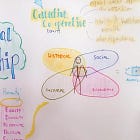




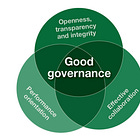






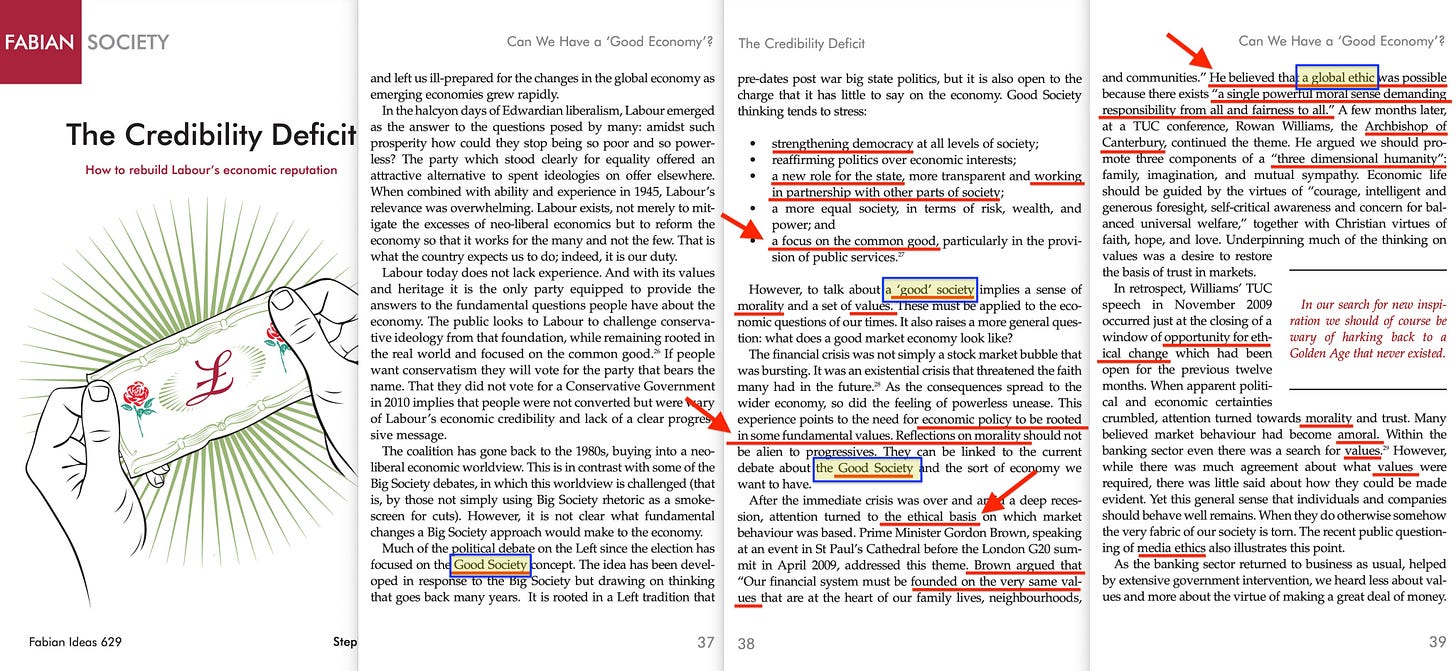

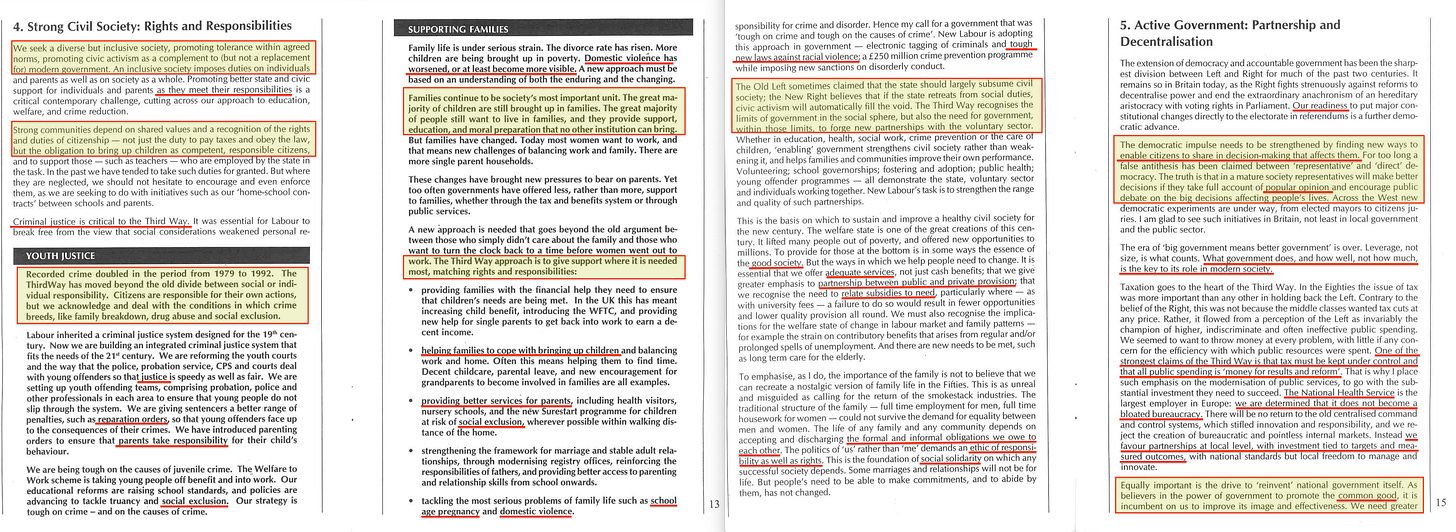

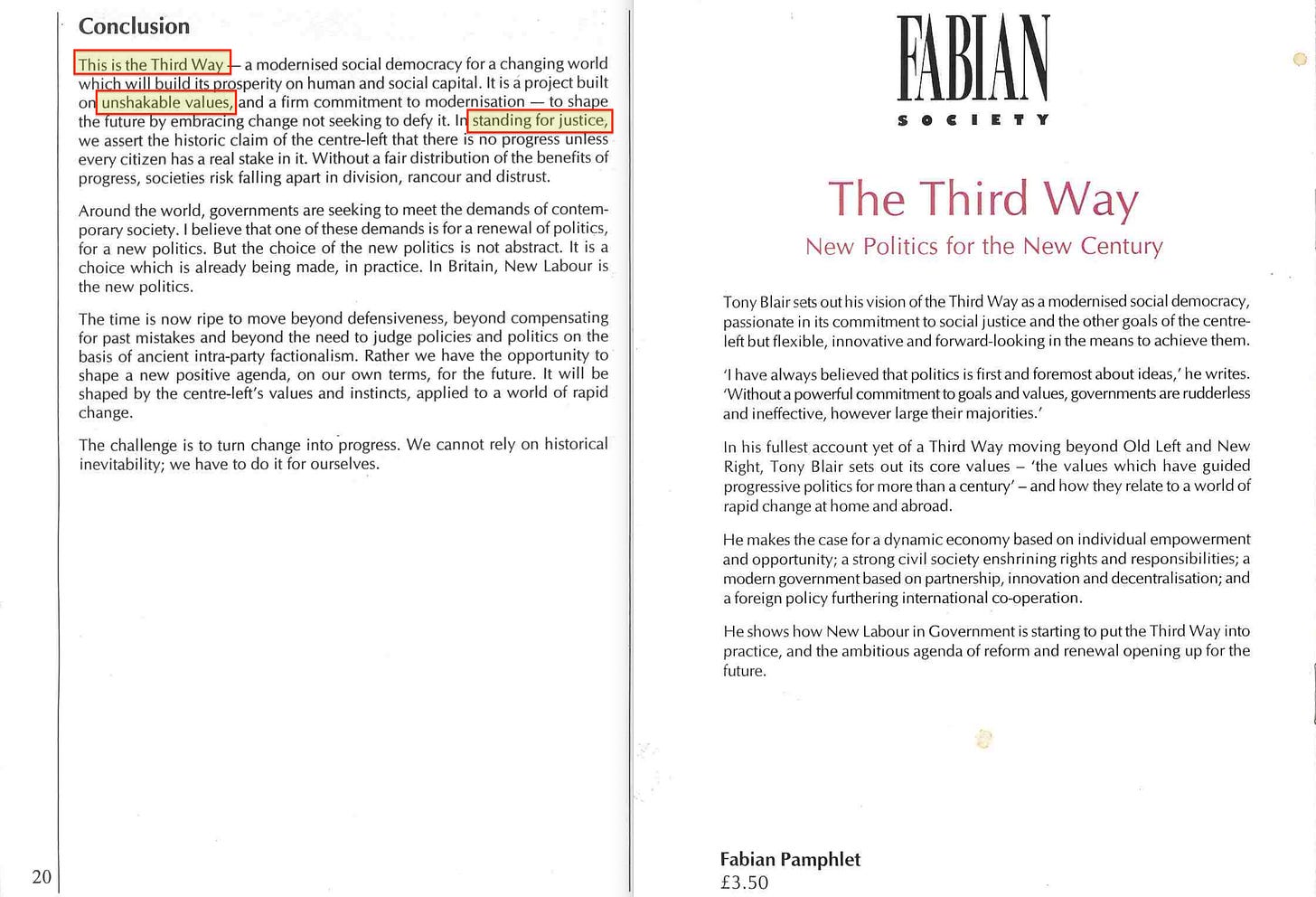
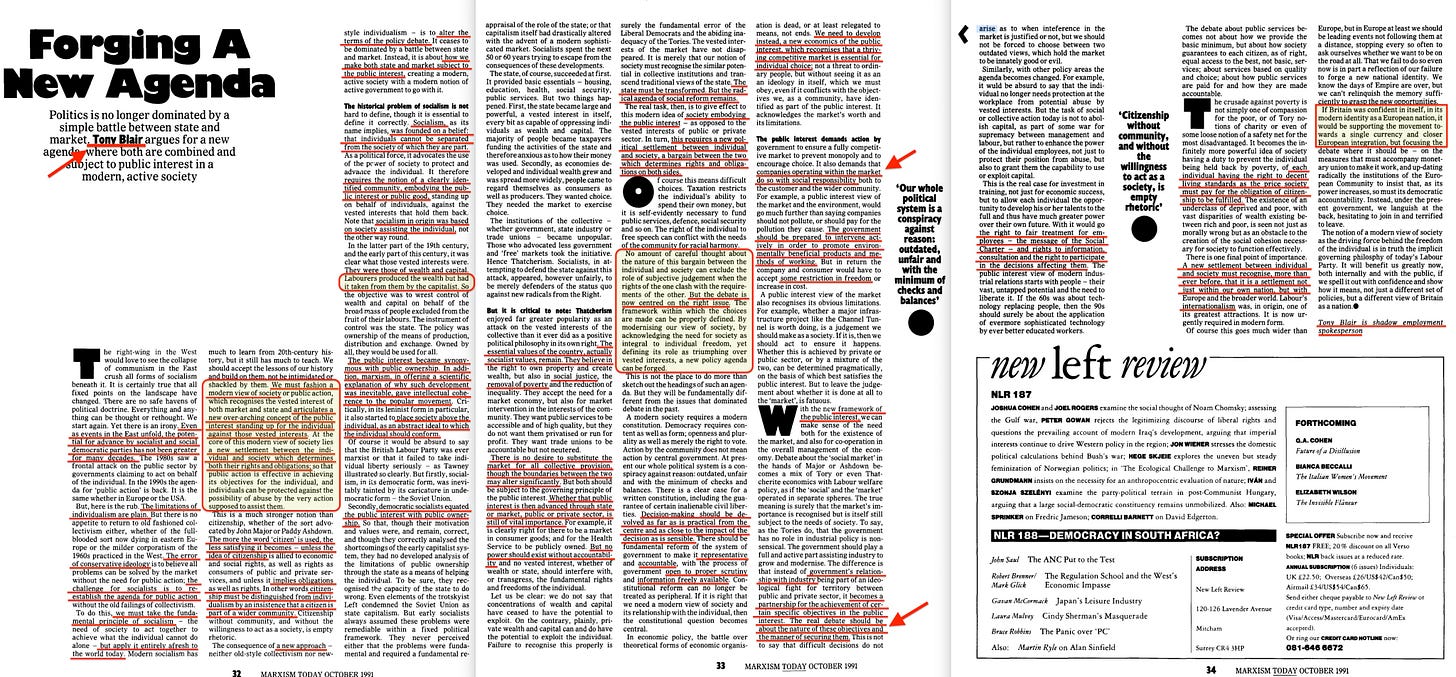



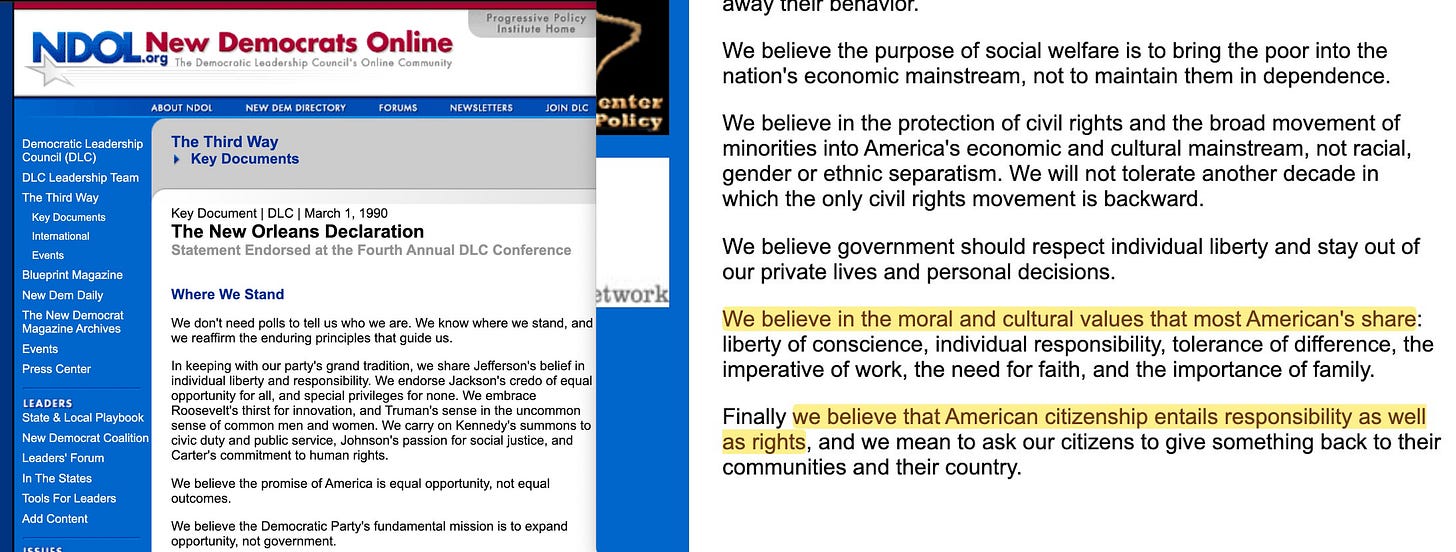
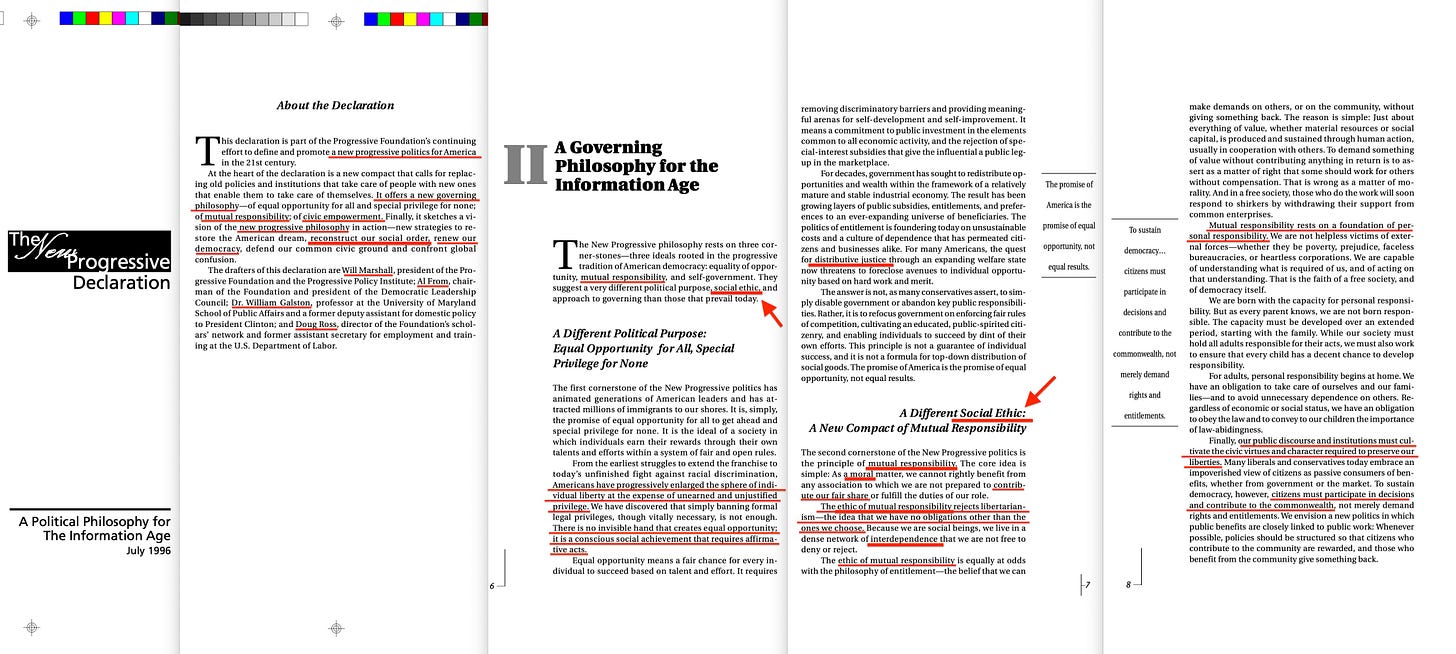




The traitor always hides in the vagueries of terms and words ill-defined, to be later defined to their specification at a later stage.
"Harmful" - to whom? Who is doing the definition of harm? Their censorship is harmful to me.
"Common good" - which commality? What good? Good to whom? It isn't good for me.
"Equal worth" - equal measured using what? Worth according to whom?
"Opportunity for All" - including the bad guys? Including crooks and criminals? What opportunity? To do what?
When traitors are forced to define their vague, evasive terminology their true plans become exposed.
Never accept vague terminology at face value.
Here it is: The third culture: How AI is changing our concouisness, made by futurologists of World Academy of Art and Science, Club of Rome, Club of Budapest, Club of Vienna, Club of Florence and Club of Amsterdam, Peace University of the United Nations. https://talksandlectures.aec.at/search/tag/41/